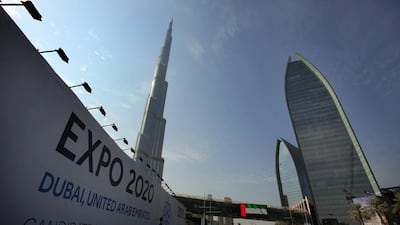Back in 2013, I was at a big party in Abu Dhabi on the day that it was announced that Expo 2020 Dubai would be held here. The results of the voting were shown on a large screen to rapturous applause. Now, finally, after the delay imposed by Covid-19, the day of opening is nearly upon us. I find that I am rather looking forward to its launch next month. I am, to be honest, slightly nervous about the large crowds. Although, having just recovered from a bout of Covid-19, I am trying to reassure myself that I am stocked with antibodies. With or without a multitude of others, I am rather keen to see what is going to be on display.
I am curious, of course, about some of the national pavilions – not just those of the UAE, but of other countries too. The Netherlands, I suspect, may be of interest, considering that country’s remarkable achievements in agriculture. There will be many others, too. And, given my concerns about the environment, I am intrigued to see the "Sustainability Showcase" themed pavilion with its topics of climate change, solar energy and a smart use of water. All to be revealed in due course, and I hope to learn a lot.
We can expect a whole range of ideas about what may lie ahead. The Expo 2020 Dubai slogan, "connecting minds, creating the future", certainly suggests new ways of thinking, new forms of behaviour that might tackle challenges that have yet to be imagined.
It will take more than one visit to grasp what is on display. I may find myself driving from Abu Dhabi to Dubai to the Expo site on several occasions. That is as it should be at such events. One visit is never enough to suffice and get a complete picture of the ideas presented.
It will be the younger visitors to Expo 2020 Dubai who have the best chance of really grasping the world of the future on display and of identifying opportunities that may be in store for them. After all, as every teacher, parent or grandparent knows, the young are often the quickest to adopt new ways of doing things while their elders struggle along behind. The rest of us will just have to learn to adapt and to try to keep up. That is not necessarily an easy thing to do. There’s often a definite, albeit unstated, unwillingness to abandon the old ways and to learn new ones. Years ago, I had to coax some of my older staff to accept the fact that the introduction of new technology meant that they had to learn new tricks. The ways that they knew and had practiced for years had become redundant. Their old skills were no longer needed. If they didn’t learn new ones, unemployment beckoned. Most of them learnt, but many found it hard.
I hope Expo 2020 Dubai will also help us comprehend something about the challenges that are posed by that process of change. I am curious about that. I don’t expect to understand it all. And yet, while that thirst for new ways of doing things is going to be a a part of life for the younger generation, I hope that tried and tested ways of doing things are not cast aside. Some forms of knowledge can remain relevant, even when they’re rarely used.
When I set out on a journey into unfamiliar terrain, for example, I find it helpful to use a GPS on my car. Once cars guided by artificial intelligence, rather than by drivers, are introduced, I will be able to sit back and be driven without giving a thought to the journey. But if the innovations don’t work, the knowledge of how actually to read a map, the ability to use my own brain instead of just pressing a button, will still come in handy. I certainly don’t want to rely on a vehicle guidance system that can’t tell the difference between a highway and a narrow road that peters out into a track across the desert, as happened to me last weekend.
I am convinced that Expo 2020 Dubai is going to be a stunning event. I am sure my imagination and that of other millions of visitors will be stimulated. As we reach for the future, though, it may be worth giving a thought to what we may be leaving behind. Will the arrival of 3D printing of buildings mean that the old skills of carpenters and stone masons fade away? Can a farmer’s knowledge of the natural world around him, learnt since childhood, ever be replaced by access to information provided by modern technology? Supplemented, perhaps, but replaced?
Here in the Emirates, in particular, we should always keep in mind the wise words of the Founding Father, Sheikh Zayed, who said that a knowledge of our past was essential to being able to understand and prepare for the future.


